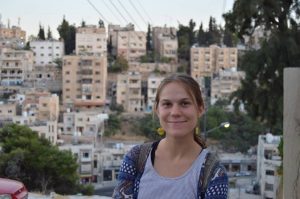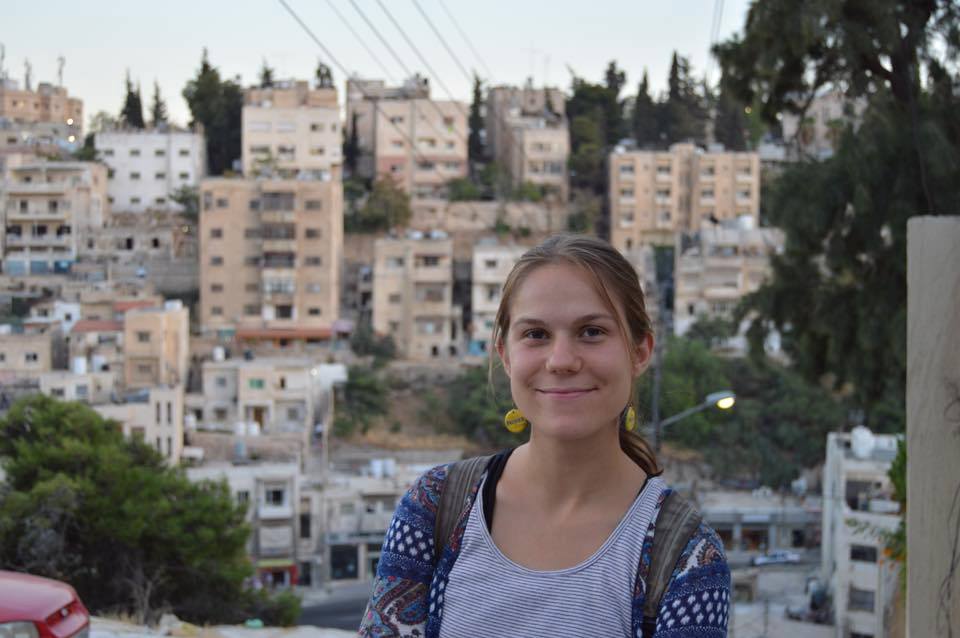
I experienced the War on Terror from a TV screen in Appalachia. Allahu akbars and AK 47s pulsed through the stillness of my living room. Tanks rolled and drones struck, black hawks and American eagles flew high over foreign skies. The earth shook and so did I.
In the quiet of the West Virginia hills, the soundtrack to the War on Terror echoed through my adolescent mind. It was a war song that I didn’t recognize, a war song that threatened my homeland, my religion, and my people. Why did they hate us? Why did they hate me? When I turned off the TV, the familiar songs of my reality sounded again – bullfrogs croaking, chickens scratching and the hum of the tractor hauling logs out back. This was the music that I knew, this was the land that I loved.
Inspired by an active imagination and a spoonful of spite, I hatched a brilliant plan to defend my land and her melodies. I would learn Arabic, join the FBI, take down Osama bin Laden and save the world from evil. I was admittedly a bit too big for my britches. But I plotted and schemed and madly applied for scholarships, and I eventually made it to the Middle East. This was step one, and this was as far as I got.
The Middle East was a whole new world and I was desperate to explore it, preferably on a magic carpet. Yet still, part of me hesitated. I was abandoning my home – a state that is 78% forest – to go live in a desert. I was leaving my life of spirited independence, voluntarily degrading myself to second class citizen in a patriarchal society. I would be restricted and oppressed. I prayed not to be another face on CNN, an unnamed casualty of terror. But I considered the possibility – my family and friends did too. These were sacrifices I would have to make.
I was nineteen, in the island country of Bahrain, off the coast of Saudi Arabia. This was it – I made it! I crammed into the backseat of a sports car with a squad of Bahraini girls, going way too fast through downtown Manama. Afroman bumped through the speakers and they knew every word. These were Arab women – and they were driving. Their hair was uncovered and they were rapping every word to a very explicit rap song. This was definitely not As Seen on TV.
And then I was in Morocco, at a rinky-dink carnival in Tangier. My twelve-year old Moroccan host sister and I trotted around the fairgrounds, munching on greasy food and communicating exclusively in animal noises. We weaved between men in long tunics and women sporting stylish hijabs, creepy carnies and children who had consumed way too much sugar. The bumper cars were a real hit. And aside from the absence of 4-H booths and a demolition derby, it could have been a county fair in the Mountain State.
And then I was twenty, scrambling over sandstone in the rocky cliffs of Petra. I crouched around a campfire with Bedouin men, sang campfire songs and drummed along with a stick and my water bottle. And although it was the middle of the night, whereabouts unknown, and the ratio of Arab men to me strikingly disproportionate, I was safe. We sang, the fire danced, and I fed my fears to the flames.
While traveling and living in the Middle East, I was repeatedly confronted with prejudices that I didn’t even know I held. Moment by moment, my fears were exposed. And moment by moment, I was proven wrong. The explosion over there, it’s a firework. The knife he’s holding, he’s using it to peel an onion. And the carpet I’m sitting on, it’s not magic. It’s just a carpet, and these are just people.
As Americans and as Appalachians, we need to spend more time on the ground in the Middle East. And I don’t mean covering more news stories and fighting more wars. I mean literally on the ground – cross legged on a cushion, breaking bread, and sharing space. And although this isn’t realistic physically, it is possible virtually.
With funding from the U.S. State Department Critical Language Scholarship and the West Virginia University Honors College, I launched a storytelling podcast titled “Sandstone”. In a series of episodes, I simulate my journey through the Arab world and introduce the people that I met along the way. They share stories of religion and romance, of comedy and self-discovery – the stories that are too often left out of the mainstream media. And I share my story too – how a farm girl raised by devout Christians in the hills of West Virginia came to connect with people and places so foreign to my upbringing.
Sandstone allows Appalachians to listen to the soundtrack of a foreign world through a pair of headphones. And if you listen closely, you will hear that the Arab world is more than just a war song. It’s a rap song and a love song, it’s carnival music and a campfire tune, it’s a melody that’s more familiar than you might expect.
Clara is host and producer of the Sandstone Podcast. She was a NSEP David L. Boren Scholar in Jordan and U.S. State Department Critical Language Scholar in Morocco. She is currently enrolled at West Virginia University where she studies Spanish, Arabic and International Studies.
Subscribe to The Patch, our newsletter, to stay up-to-date with new expatalachians articles and news from around Appalachia.


